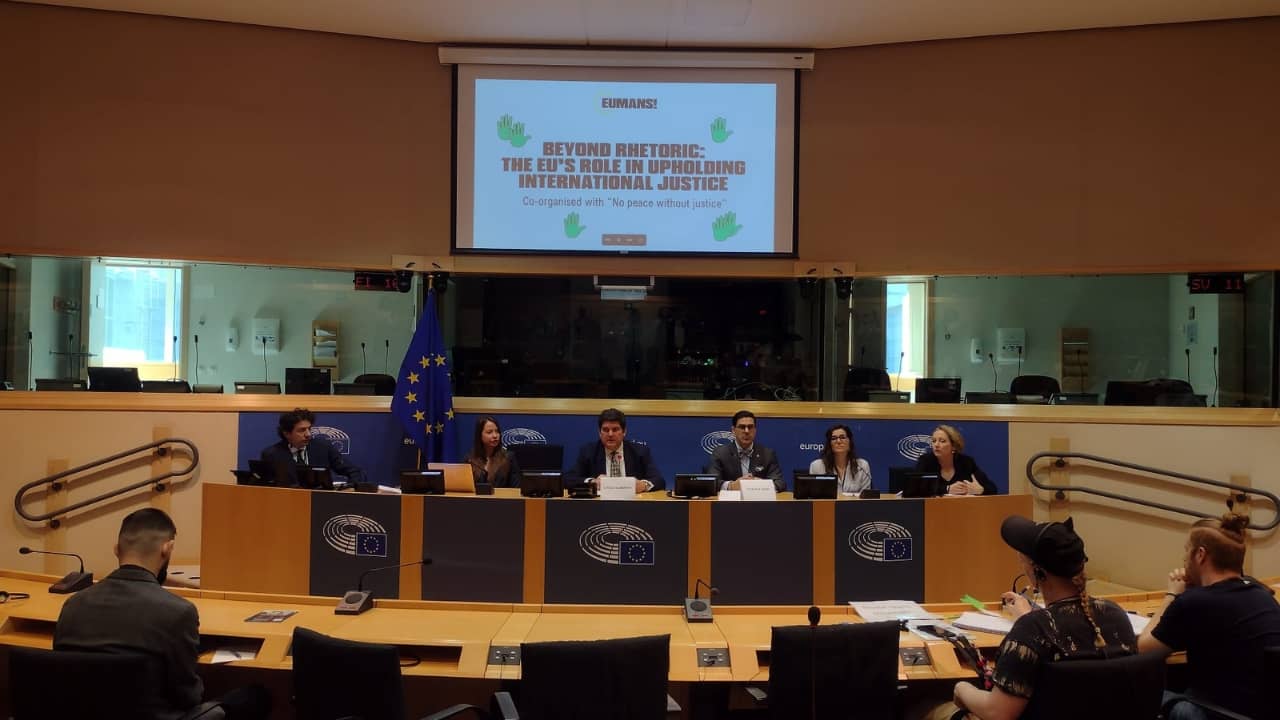Strasbourg/New York/The Hague:
On International Justice Day, celebrated throughout the world in order to commemorate the adoption of the Rome Statute on July 17, 1998, establishing the International Criminal Court, PGA welcomes the European Parliament’s adoption of the Resolution on the crime of aggression (Kampala Amendments). It comes as no surprise that the European Parliament chose such a symbolic date to adopt the resolution, as the decision to celebrate International Justice Day was taken in Kampala (Uganda) in 2010, at the Review Conference of the Rome Statute where the Kampala Amendments were adopted.
By an overwhelming majority, the resolution, initiated by PGA Member, Barbara Lochbihler, MEP (Germany), the European Parliament took another significant step in its efforts to support the work of the International Criminal Court, promote the end of impunity for the perpetrators of the most serious crimes of concern to the international community and underline the importance of the principle of universality of the Rome Statute, encouraging its Member States to first ratify the amendments and then positively support the one-time decision by the Assembly of States Parties to the Rome Statute, once the required 30 ratifications are achieved, to activate the ICC’s jurisdiction for the crime of aggression.
The Kampala Amendments on the crime of aggression are the result of a centuries-old project to criminalize aggressive war-making. When ratifying the Charter of the United Nations, states have already committed themselves to the prohibition of the illegal use of force. By empowering the International Criminal Court, as soon as possible, to hold accountable those individuals allegedly responsible for the most serious violations of the prohibition of the illegal use of force, States can build upon and reaffirm the commitments undertaken several decades ago.
Concretely, by way of ratification of the Kampala Amendments, States bind their nationals and their territory to the criminalization of acts of aggression arising from the illegal use of force in international relations. This resolution is an important contribution to the goal of achieving 30 ratifications before 2017. Most importantly, the European Parliament,
by the adoption of the Resolution, strengthens the international legal framework that prohibits the use of force and increases the guarantees of peace and of respect for the territorial integrity of the States Parties to the Rome Statute. To date, fifteen nations from all regions of the world have ratified both Amendments - Liechtenstein, Samoa, Luxembourg, Estonia, Trinidad and Tobago, Germany, Botswana, Cyprus, Slovenia, Andorra, Uruguay, Belgium, Croatia, Slovakia and Austria. This resolution, taken in the democracy-heart of the European Union, brings real expectations that more ratifications from European countries will follow soon.
PGA was closely involved in these developments as MEP Helmut Scholz (Chairperson, PGA Group in the European Parliament) organized a thematic meeting on the Crime of Aggression at the European Parliament, Brussels, on 28 November 2013, which was key in bringing, inter alia, the idea of a key action to support the ratification of the Kampala Amendments by EU Member States: a resolution on Crime of Aggression to call EU countries to ratify and implement the Kampala Amendments as well as to call the EU to adopt a common position on the crime of aggression.
Judge Hans-Peter Kaul was instrumental in this process as he participated in the thematic meeting carried out at the European Parliament in November 2013. His contributions were essential to orient the discussions, shared his experience as a judge at the ICC and to highlight the link between human rights and the aggressive use of force as humanity experienced in WW I and WW II. Furthermore, MEP Barbara Lochbihler, author of the approved resolution, organized a working breakfast on 19 February 2014 with the “EP Friends of the ICC” and the PGA Group at the European Parliament where the draft Crime of Aggression motion was about to be discussed.
At a time where several and serious wars are being fought in different corners of the world, this resolution calling for all states to ratify the Kampala amendments on the crime of aggression, must be seen by the international community as another important contribution to the efforts undertaken to bring justice to victims of the most serious crimes. Those allegedly responsible for planning, preparing, initiating or executing an act of aggression by a State against another State should be brought to justice. This Resolution not only is in line with the UN General Assembly Resolution 3314, but it certainly reaffirms the principle at the heart of the UN Charter: crimes against peace shall not be tolerated. I am very glad that the text I initiated found such a large majority. This brings hope for all of those who we believe a more just world is possible. Statement by MEP Barbara Lochbihler, European Parliament (Germany) and PGA Member
As Chair of PGA and the organiser of the meeting that marked the beginning for the preparation of today’s resolution by the European Parliament regarding illegitimate use of force, I believe that the possibility of prosecuting political or military leaders that - in manifest violation of the UN Charter, allegedly engage in an act of aggression - is a groundbreaking step in the fight against impunity and an important development in the process of building last and durable peace around the globe.
The overwhelming majority of the Members of the European Parliament supported today our position urging the EU to be at the forefront in pushing for the Kampala Amendments on the crime of aggression to enter into force and to activate the ICC’s jurisdiction for this crime. I would like to personally thank Judge Hans-Peter Kaul, from the ICC, who from very early stages was fully supportive and instrumental to make this Resolution possible. He provided the MEPs present in the first meeting on this topic in late 2013 with invaluable guidance and he shared his legal and practical expertise.
The call for an EU-common position not only sends a clear message to Europe, but also to the entire world: States need to be united and committed to fight for a world free of armed conflicts. Statement by Mr. Helmut Scholz, Chairperson, PGA Group in the European Parliament/Member of the European Parliament Friends of the ICC
The European Parliament’s resolution on the crime of aggression is a great step forward for the ratification process of the Kampala amendments. This decision places the amendments in the context of the campaign for universality of the Rome Statute and is a significant contribution to the acceptance of the revised Rome Statute. We look forward to deepen our cooperation with our EU partners and welcome Austria as the ninth EU state to ratify the amendments. Statement by Ambassador Christian Wenaweser, (Liechtenstein), Permanent Representative of Liechtenstein at the United Nations and Chair of PGA UN Committee
This resolution was voted through by an overwhelming majority of the European Parliament clearly demonstrating the European commitment to the fight against crimes against humanity, war crimes and the crime of aggression and most importantly the fight to remove impunity for these atrocious crimes. Having been in Kampala at the International Criminal Court Review Conference in 2010 when the Kampala Amendments were agreed upon, I am certain that the Amendments’ definitions and this resolution will allow for a smooth coordination of national legislation on this matter. National investigations and prosecutions of the most serious international crimes by EU Member States will be easier and we will see better cooperation with and greater support for the Court as a result. Statement by MEP Richard Howitt (UK), European Parliament, Spokesperson on Foreign Affairs for the Socialists & Democrats Group
The debate and vote in the European Parliament of a resolution calling all States to ratify the Kampala Amendments is a major step taken by the European countries to join all the other like-minded countries like Uruguay, that have already acceded to these important instruments that aim to affirm the UN Charter’s principle of prohibition of the illegal use of force and the promotion of the human right to peace. I have personally supported the ratification of the Kampala Amendments by Uruguay last year and I hope that soon more countries in the world will commit with the world’s peace through the ratification of the Kampala Amendments. This action taken by the European Parliament after the resolution of Parlatino last year promoting the ratification of the Kampala Amendments, set examples that all the regional parliaments should follow such as the PARLASUR among others. Statement by Dip. Felipe Michelini, (Uruguay) Covenor of PGA’s International Law and Human Rights Program
Austria is proudly joining today the first group of countries that have ratified the Kampala Amendments on the crime of aggression and war crimes. As a PGA Member, I am proud of this accomplishment which I contributed to achieve via parliamentary questions and reports on this crucial matter for a World governed by law and not by force. Statement by MP Petra Bayr (Austria), PGA Member




